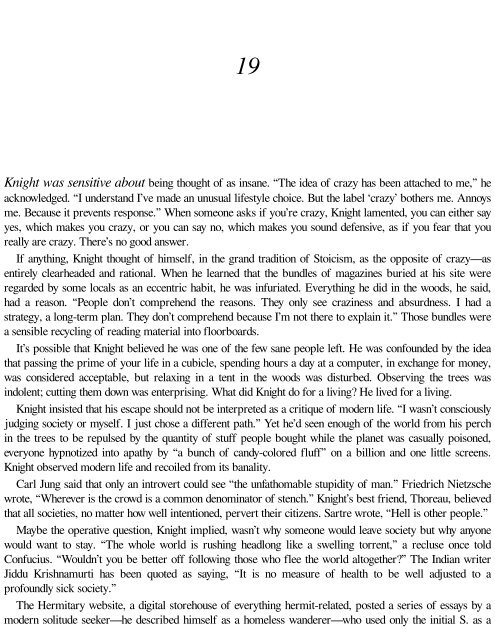You also want an ePaper? Increase the reach of your titles
YUMPU automatically turns print PDFs into web optimized ePapers that Google loves.
19<br />
Knight was sensitive about be<strong>in</strong>g thought of as <strong>in</strong>sane. “<strong>The</strong> idea of crazy has been attached to me,” he<br />
acknowledged. “I understand I’ve made an unusual lifestyle choice. But <strong>the</strong> label ‘crazy’ bo<strong>the</strong>rs me. Annoys<br />
me. Because it prevents response.” When someone asks if you’re crazy, Knight lamented, you can ei<strong>the</strong>r say<br />
yes, which makes you crazy, or you can say no, which makes you sound defensive, as if you fear that you<br />
really are crazy. <strong>The</strong>re’s no good answer.<br />
If anyth<strong>in</strong>g, Knight thought of himself, <strong>in</strong> <strong>the</strong> grand tradition of Stoicism, as <strong>the</strong> opposite of crazy—as<br />
entirely clearheaded and rational. When he learned that <strong>the</strong> bundles of magaz<strong>in</strong>es buried at his site were<br />
regarded by some locals as an eccentric habit, he was <strong>in</strong>furiated. Everyth<strong>in</strong>g he did <strong>in</strong> <strong>the</strong> woods, he said,<br />
had a reason. “People don’t comprehend <strong>the</strong> reasons. <strong>The</strong>y only see craz<strong>in</strong>ess and absurdness. I had a<br />
strategy, a long-term plan. <strong>The</strong>y don’t comprehend because I’m not <strong>the</strong>re to expla<strong>in</strong> it.” Those bundles were<br />
a sensible recycl<strong>in</strong>g of read<strong>in</strong>g material <strong>in</strong>to floorboards.<br />
It’s possible that Knight believed he was one of <strong>the</strong> few sane people left. He was confounded by <strong>the</strong> idea<br />
that pass<strong>in</strong>g <strong>the</strong> prime of your life <strong>in</strong> a cubicle, spend<strong>in</strong>g hours a day at a computer, <strong>in</strong> exchange for money,<br />
was considered acceptable, but relax<strong>in</strong>g <strong>in</strong> a tent <strong>in</strong> <strong>the</strong> woods was disturbed. Observ<strong>in</strong>g <strong>the</strong> trees was<br />
<strong>in</strong>dolent; cutt<strong>in</strong>g <strong>the</strong>m down was enterpris<strong>in</strong>g. What did Knight do for a liv<strong>in</strong>g? He lived for a liv<strong>in</strong>g.<br />
Knight <strong>in</strong>sisted that his escape should not be <strong>in</strong>terpreted as a critique of modern life. “I wasn’t consciously<br />
judg<strong>in</strong>g society or myself. I just chose a different path.” Yet he’d seen enough of <strong>the</strong> world from his perch<br />
<strong>in</strong> <strong>the</strong> trees to be repulsed by <strong>the</strong> quantity of stuff people bought while <strong>the</strong> planet was casually poisoned,<br />
everyone hypnotized <strong>in</strong>to apathy by “a bunch of candy-colored fluff” on a billion and one little screens.<br />
Knight observed modern life and recoiled from its banality.<br />
Carl Jung said that only an <strong>in</strong>trovert could see “<strong>the</strong> unfathomable stupidity of man.” Friedrich Nietzsche<br />
wrote, “Wherever is <strong>the</strong> crowd is a common denom<strong>in</strong>ator of stench.” Knight’s best friend, Thoreau, believed<br />
that all societies, no matter how well <strong>in</strong>tentioned, pervert <strong>the</strong>ir citizens. Sartre wrote, “Hell is o<strong>the</strong>r people.”<br />
Maybe <strong>the</strong> operative question, Knight implied, wasn’t why someone would leave society but why anyone<br />
would want to stay. “<strong>The</strong> whole world is rush<strong>in</strong>g headlong like a swell<strong>in</strong>g torrent,” a recluse once told<br />
Confucius. “Wouldn’t you be better off follow<strong>in</strong>g those who flee <strong>the</strong> world altoge<strong>the</strong>r?” <strong>The</strong> Indian writer<br />
Jiddu Krishnamurti has been quoted as say<strong>in</strong>g, “It is no measure of health to be well adjusted to a<br />
profoundly sick society.”<br />
<strong>The</strong> Hermitary website, a digital storehouse of everyth<strong>in</strong>g hermit-related, posted a series of essays by a<br />
modern solitude seeker—he described himself as a homeless wanderer—who used only <strong>the</strong> <strong>in</strong>itial S. as a
















